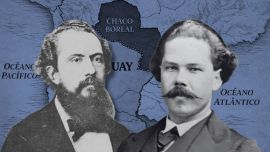Axel Kicillof launched a fierce attack of the Mauricio Macri administration on Tuesday, vowing to "reconstruct" a crisis-stricken Buenos Aires Province as he was sworn-in as the region's new governor.
In a ceremony that took place at the Provincial Legislature in La Plata, the former economy minister warned that the region faced a food emergency, laying the blame at outgoing president Mauricio Macri and his predecessor, María Eugenia Vidal.
“Today, I come to commit myself to working without rest to reconstruct the Province [...] the result shows the most important thing that we have, the popular will,” Kicillof said, citing the electoral spread of 15 points that ushered him into the province’s main executive post.
The swearing in was delayed by one day so that Kicillof could attend the inauguration of fellow Frente de Todos victors, Alberto Fernández and Cristina Fernández de Kirchner, who returned the favour, travelling to the provincial capital for the event.
Kicillof was joined by his wife Soledad Quereilhac and his two children. The newly minted president and vice president were also present, symbolic of how the then-candidates worked in tandem throughout the campaign earlier this year.
After Vidal had passed over the symbolic sash and baton, Kicillof delivered his first gubernatorial address to provincial lawmakers, during which he soundly repudiated the politics of the departing national administration led by president Mauricio Macri.
Kicillof described the province he now leads as stuck in the middle of a “financial, productive and tariff emergency.”
The governor, describing his inheritance, said he’d been left “very high unemployment and debt.”
Their policies, he said, made Buenos Aires Province “always the first victim.”
Economy
Addressing the province’s cinokex financial situation, Kicillof painted a fairly grim picture, attributing the hardship to the “economic national policies” imposed by Macri.
“Costs were reduced by cutting spending everywhere and so there was less economic activity. This happened in 2008 during the economic crises in Europe. More austerity, fewer tax collections, more deficit. It’s a vicious cycle,” he said.
The new governor also cited the recent poverty report out of the Catholic University of Argentina (UCA) which put the number of Argentines living in extreme poverty at 5.5 million people. He called it a “food emergency,” and said that to “end hunger and vulnerability, there has to be work.”
To that end, he implored lawmakers to think of the “9,500 businesses closed in the last four years” as “people, workers, stores, producers” rather than just numbers.
Finally, he articulated a number of tenets of his economic platform: Buenos Aires needs a “sustainable” way to pay off its debt; companies should revise the price increases announced by his predecessor in order to participate in a “fair scene”; and high taxes on lower-income individuals like the retired should be reduced.
Security
Kicillof also spoke of rising crime rate in the province, calling it “reality” not “political marketing.” He specifically highlighted crimes related to drugs and narcotics-trafficking, which he said grew by 126 percent in the last four years.
However, the new leader was quick to point out that he doesn’t believe increased incarceration is the answer. Argentina’s incarcerated population has grown by 55 percent over the last six years, creating an “overpopulation problem,” that drives poor living conditions for those under the control of the State.
“These severe problems of basic human rights like health and food generate very difficult conditions, nearly inhumane,” he said.
Rising crime, he said, won’t be solved by making continued budget cuts or adjustments. “We have to bring security to all those living in Buenos Aires,” he said.
Health, education and science
Here, Kicilloff also said Buenos Aires is in a state of emergency. “The province has a debt in dollars but also in [terms of] health and education,” he said.
In particular, he referred to the need to “defend public schools, universities, science and investigation.”
Along these lines, he “lamented” the continued lack of gender parity. However, Kicilloff said he “intended to address the delay from the first day.”
The new leader's provincial Cabinet will be sworn in Thursday in La Plata.
– TIMES/PERFIL

























Comments